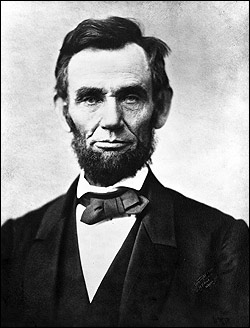Don’t ever call anyone gay. You’re only asking for trouble. It doesn’t matter how many composers thank their partners at the Tonys, how many queer eyes help straight guys, or how many guest celebrities gamely trade quips with Will and Grace—America is still not comfortable with the notion of anybody really being homo. The second you claim a beloved public figure has pink persuasions, most of the nation will leap up and angrily demand you show ironclad evidence, which, apparently, can only be a videotape of the accused male wearing a feather boa, listening to “Love to Love You, Baby,” and taking it up the keester while yowling, “Women? Eeeeew!”
Look where it got poor C.A. Tripp. The author of the recently released biography The Intimate World of Abraham Lincoln died in 2003 and now has to lie in the cold, cold ground while fellow historians kick at his dirt. Tripp, if you haven’t heard, claims in his book that Honest Abe was honestly a poofter. Some of Tripp’s prose may get a little excitable, but he’s got a couple of as-yet- irrefutable facts that have nervous naysayers struggling to negate: According to the notes of his own regiment, one Capt. David V. Derickson “frequently spent the night at [Lincoln’s] cottage, sleeping in the same bed with him, and—it is said—making use of his Excellency’s nightshirt!”; another quote from Billy Greene, a clerk with whom Lincoln also shared a small bed, claims Abe’s “thighs were as perfect as a human being could be.”
Oh, the horror! Even though we have, up until this moment, all been schooled with the stringent notion that the past was a decidedly non-touchy-feely time “when men were men,” it now appears that such history is allowed to be a little more elastic so long as it keeps former statesmen out of Oscar Wilde’s way. “It’s not something you see in John Ford movies,” writes Michele Orecklin in her Time review of Tripp’s book. “But in the 1800s it was common for men—frontier-taming, campfire-building, heterosexual men—to share a bed.” Not content to notify us that Hollywood Westerns have been remiss in showing big brave bucks at goddarned straight slumber parties, Orecklin later wonders, “And what if Lincoln was gay? Does it illuminate anything about his decisions as President?” Anthony Rotundo, author of a book on American manhood, is brought into it to fretfully remind us that in Abe’s time “you didn’t have to say, ‘I’m this side or that,’ as you do today.” Uh-huh.
Richard Brookhiser is even more defensively pensive in his New York Times review. “One wonders: What does it mean to be homosexual?” he asks, as though that question hasn’t been answered several times over by decades of art, Oprah, and Powertool. “Towering above [this] is the man who saw liberty and equality as the same thing. . . . This is the Lincoln that matters. The rest is biography.”
Well, sure. Maybe old Abe was a flamer, maybe he wasn’t. But history, biography, and the future of a world that needs more than ever to strive for the complexities of truth can never hope to be complete until we don’t view sexuality as an insult, an intrusion, or a nagging reminder of the vastness of the human condition.








